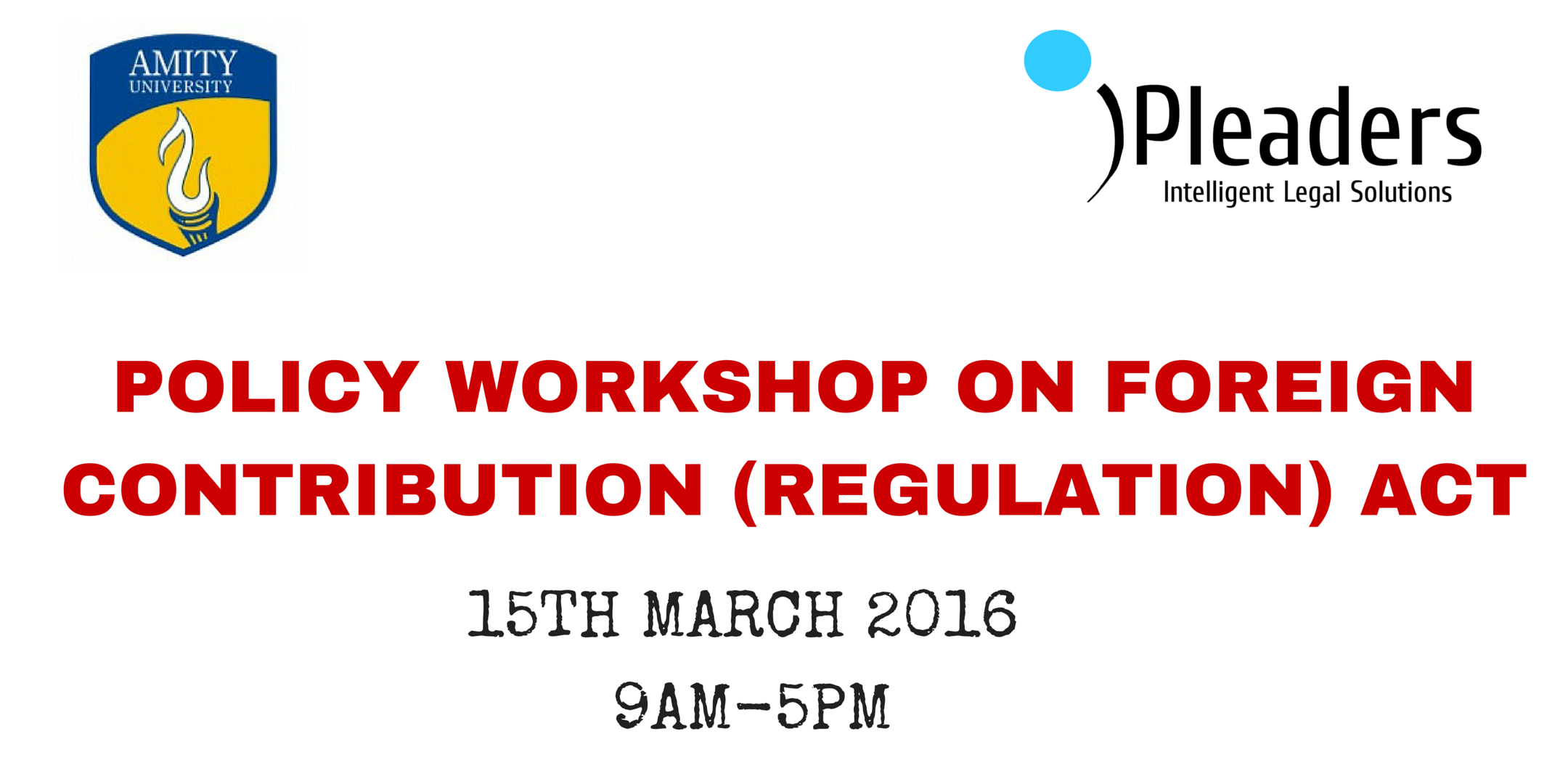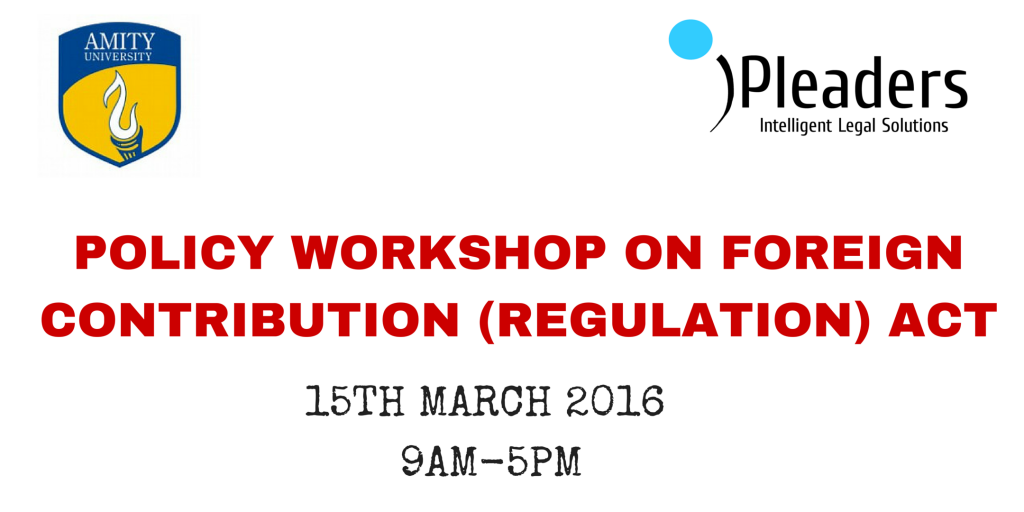A Policy Workshop on Foreign Contribution (Regulation) Act, was organised jointly by Amity Institute of Public Policy and Amity Law School, Noida, in partnership with iPLeaders Delhi, on 15th of March, 2016 at Amity University Campus Noida.
The attendees to the workshop were law students and working professionals from social and public organizations and the Panel consisted of eminent lawyers, chartered accountants, corporate executives and representatives of Social organizations, the workshop focused on highlighting the Amendments made to the Foreign Contribution (Regulation) Act in May 2010 which came into force on The 1st of May, 2011 and the Most Recent Amendments in December 2015, the Act came into existence in 1976.
First to address the workshop was Mrs. Siboni Sagar on the Legal Challenges to Act, she Started by providing a brief background of the Act and the objectives with which it was initially enacted in 1976 which were to control foreign funding and foreign hospitality, ensuring consistency by not taking a corporate structure and for regulating personal life, next she raised the present day challenges faced by Non-Governmental Organizations after the Amendments in 2010 and 2015, notices for cancellation of registration under the Act for Non-Compliance of Annual Return which is Mandatory for every Organization under Section 18 of the Act, further, she raised the legal challenges to Sections 9, 12 ,14 & 19 of the Act raising an important question that the money collected is for profit or not as the Act only governs Non Profit Non Governmental Organizations and not Corporates, she further supported the challenges raised by her by a case law “Shreya Singh Vs. Union of India AIR 2015 SC 1523”through which the main questions raised by the court which were to be determined is that if the law being infringed is paramount or not and also the point that if state interest is same as political interest. As cutting access to resources is restricting their intentions which are not just financial but also subjective and objective raising the crucial question that is such measure aligned to State Interest or Political Interest.
The second panelist to address the workshop was Mr. Rajesh Malani a chartered accountant by Profession who briefed on the Latest Amendments made to the Act in 2015, with the main objective to make the procedures paper free as every process for filing of forms and returns were made Online, he stated the Act to be a Security Lock than a Financial one, he further highlighted the amendments which were related to Forms, Annual Returns , Financial Transactions and duties of banks and in regard to compliances to be made while changing more than 50% of Board members/ Office bearers, as previously there were 10 Forms under the Act but now they have been merged into 6 Forms, in terms of Annual Return it is now mandatory to upload online every three months of every transaction of more than Rs. one crore with details of donor also banks need to report every transaction exceeding one crore within 48 hours to Ministry of Home Affairs , also previously there were 56 purposes were stated under the Act now they have been categorised into 5 broad categories social, economical, cultural, religious and Educational, but the Most Controversial of all is the one which proposes to alter the definition of “Foreign Source” and make it Retrospective which will Shadow Political Parties Like BJP and Congress who have been held by Delhi High Court in 2014 for accepting foreign fund which is prohibited under Section 3(1)F of the Act.
Next to the podium was Dr. Jyotna M Singh who is presently associated with voluntary Action Network India (VANI) and addressed the workshop on Implications of the Act on Indian CSO and NGO, she started by raising the fact that out of 40000 of civil society organizations and Non-Governmental Organizations only 20000 are reporting under the Act,which shows that there is a unawareness among such organizations related to foreign funding, she further pointed out the new Arbitrary search and seizure powers against such organizations which makes the Act go against National Policy of Voluntary Sectors, next she brought up the issues faced by CSO’s and NGO’s after the Amendments which are some technical snags related to Filing of the Online Form FC4, a question about the Security of the online data submitted by the organizations, and also the lack of clarity in communications between the organizations and Ministry of Home Affairs was addressed by her but she was also humble enough to point out that the Team in Ministry of Home Affairs controlling the aspects related to the Act were short on manpower and are working to resolve the technical snags on the online portal, she ended with suggesting certain recommendations which were, a check to be kept on MHA regarding the functionality of the Act, the Search & Seizure provisions under the Code of Criminal Procedure shall be repealed, the Re-registration policy should also be checked and there should be more transparency, regular capacity building and better communications between the Government and the Organization.
The fourth panelist was Mr. Prakash Sinha, who spoke on the Legal Remedies, he started by highlighting two different Act’s FEMA & FCRA, the former applies on For-Profit or Corporate Organization which is much lenient in respect to compliances to be followed then the latter which is to govern Non-Profits and Non-Governmental Organizations is much stricter, he further highlighted issues of visible & invisible hospitality, consolidation for purpose of regulation which can be of difference of interest and ended on the note that procedural compliance can overlook national compliance.
To follow was Mr. Sachin Sinha who covered the aspects related to Maintenance & Audit of Accounts, he started by emphasising on the roles of Chartered Accountants which is very important as under Form FC4 the Financial Statements of the Organizations needs to be prepared which needs a C.A certificate certifying the organization, and it’s Purpose being fulfilled he also covered the various deadlines to be followed for filing the audits.
Next to the podium was Mr. Kabir Dixit putting a litigator’s perspective, he started by regarding the Act as a nascent law and pointing out that there are certain provisions which have nuances to it and even the authorities have a lesser understanding of how to deal with them and how they are to be implemented, further emphasizing on the Doctrine of Regidem Generous he stated the Act exceeds far more restriction than any other.
The last speaker was Mr. Arunava Mukherjee who raised the point that not many of the groups approach the Court as many licences were cancelled but not everyone approached the courts, he also emphasised on the difference between FEMA & FCRA as some previous panellist also did on the far exceeding restrictions put on FCRA than FEMA as FCRA was implemented in the emergency era.
To Conclude the Panelist Mr. Ramanuj Mukherjee co-founder of iPLeaders came with the question regarding the future of NGO’s, to which the Panelist came to view that the Foreign donations are decreasing, and that organization are taking the route of For-Profit under FEMA which has fewer Compliances to be followed especially by Mr. Vivek Jain who said there is this trend nowadays to go for the For-Profit Structure, with this lunch was called, Post Lunch Session was more of an interactive session with first Mr. Ramanuj Mukherjee enlightening the audience about various initiatives to reform Legal Education in the country in the light of the project LawSikho, ClickLawyer and SuperLawyer club then High Tea was arranged for the Attendees following which, Mr. Anjani Kumar hosted a problem-based interactive session with the Attendees to clear out any remaining doubts of the attendees.
The workshop provided a very detailed insight to the Act and the complications attached to it,and raised many important questions some being is the Act really necessary? is there a security threat? Why isn’t corporates and For Profit Organizations dealt with such heavy compliance regarding foreign funding and the most important one challenging the latest proposed amendment to make the definition of foreign source retrospective, which clearly shows how political interest is given importance over state interest which raises a question on the strictness implemented through the Act.
 Serato DJ Crack 2025Serato DJ PRO Crack
Serato DJ Crack 2025Serato DJ PRO Crack









 Allow notifications
Allow notifications


